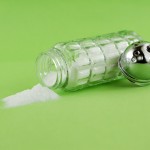 Did you know that 11.1 million cases of high blood pressure could possible be prevented every year if Americans adhere to normal levels of sodium intake?
Did you know that 11.1 million cases of high blood pressure could possible be prevented every year if Americans adhere to normal levels of sodium intake?
High sodium intake is one of the most common causes of high blood pressure. While maximum daily sodium intake is 2,300 milligrams, on average an American daily eats 3,400 milligrams of sodium. By cutting the sodium intake to permissible limits, Americans can reduce their total health care expenditure by $18 billion.
Excessive sodium intake and high blood pressure
Excessive sodium intake disturbs the body’s state of equilibrium. When we eat high amount of salt, our kidneys fail to process all of the salt. As a result of which, the excessive salt is pushed in the bloodstream.
To counter the salt presence in the bloodstream, our body allows more water to flow in the bloodstream. And it is the extra water added in the bloodstream which leads to high blood pressure.
While you may add less salt in your meal preparation to cut down the sodium intake, the fact of the matter is that if you often eat out then you are likely to be consuming sodium in excessive amounts. Processed foods, as well as food served in restaurants typically have high sodium content. Studies show that processed foods account for more than 70% of sodium in the typical American diet.
Food that have high sodium content
If you are a high blood pressure patient then you need to completely avoid processed foods. Processed foods are high on salt content and should be avoided or at best consumed in moderate amounts by people who even have normal blood pressure.
Names of the some of the common foods that have high sodium content are: salsa, bacon, cold cuts, condiments, soup, and pickles. Avoid these foods and when eating out, check if low-sodium options are available. Further, when buying processed foods always read the contents before purchasing the product. Don’t take “low sodium” content declaration on the canned food at its face value – some low sodium processed food, in fact are loaded with sodium.
Is sodium bad for our body?
No, our body requires sodium to perform various functions normally. It is the excessive sodium present in our body that is harmful. While our body’s daily requirement of salt is 500 milligrams, most folks consume 10 times more than this.
Eat healthy and exercise regularly to control blood pressure
Avoid processed food and cook your own meal to ensure that you do not consume more than required amount of salt. Also, eat more wholesome foods, such as fruits, nuts, vegetables, legumes, and fresh meat.
Regular exercise helps in reducing total cholesterol and bad cholesterol levels, as well as assist in reducing the plaque buildup.
To learn about the exercises that can help you in blood pressure management, see our high blood pressure exercises guide.
You may also be interested in checking out natural high blood pressure information here.
EL331015

 Multiple Sclerosis
Multiple Sclerosis Banishing Bronchitis
Banishing Bronchitis Gum Disease Gone
Gum Disease Gone Overcoming Onychomycosis
Overcoming Onychomycosis Neuropathy No More
Neuropathy No More The Prostate Protocol
The Prostate Protocol Brain Booster
Brain Booster
 Ironbound
Ironbound
 Solution for Shingles
Solution for Shingles
 The Bone Density Solution
The Bone Density Solution
 The Ultimate Healing Protocol
The Ultimate Healing Protocol
 The Parkinson's Protocol
The Parkinson's Protocol
 The Chronic Kidney Disease Solution
The Chronic Kidney Disease Solution
 Overthrowing Anxiety
Overthrowing Anxiety The Fatty Liver Solution
The Fatty Liver Solution The Hypothyroidism Solution
The Hypothyroidism Solution
 The End of Gout
The End of Gout The Blood Pressure Program
The Blood Pressure Program
 The Oxigized Cholesterol Strategy
The Oxigized Cholesterol Strategy
 Stop Snoring And Sleep Apnea Program
Stop Snoring And Sleep Apnea Program
 The Arthritis Strategy
The Arthritis Strategy The Vertigo & Dizziness Program
The Vertigo & Dizziness Program The 3-Step Diabetes Strategy
The 3-Step Diabetes Strategy Hemorrhoids Healing Protocol
Hemorrhoids Healing Protocol The Erectile Dysfunction Master
The Erectile Dysfunction Master Weight Loss Breeze
Weight Loss Breeze The IBS Program
The IBS Program The Insomnia Program
The Insomnia Program The Migraine and Headache Program
The Migraine and Headache Program The Neck Pain Solution
The Neck Pain Solution The Menopause Solution
The Menopause Solution The Ejaculation Master
The Ejaculation Master The TMJ Solution
The TMJ Solution The Acid Reflux Solution
The Acid Reflux Solution The Fibromyalgia Solution
The Fibromyalgia Solution The Psoriasis Strategy
The Psoriasis Strategy